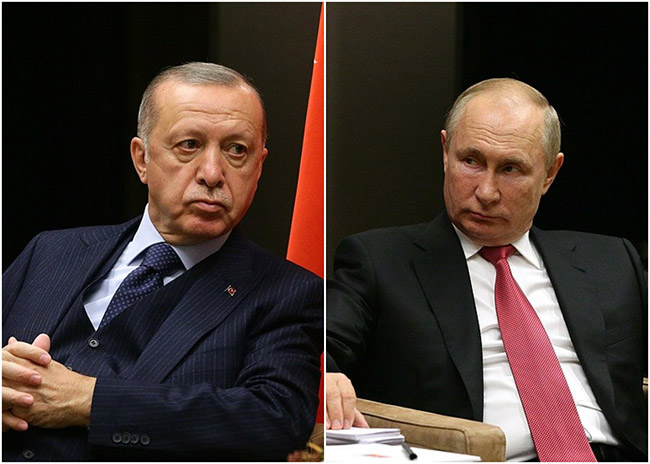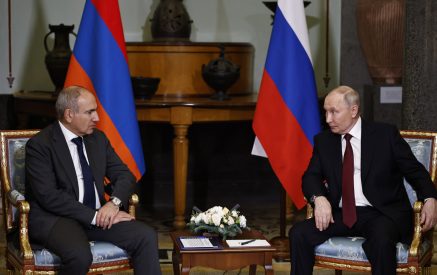Erdogan’s plans to use force from the Sochi talks have vanished
The President of the Russian Federation recently met the President of Turkey in Sochi, the former not having yet been worthy of a meeting with the US President and feeling slightly insulted by it. Recently, Vladimir Putin has isolated himself because people around him were discovered to have the coronavirus. Given the fact that he made an exception for the meeting with Erdogan, it must be concluded that the issues on the Russian-Turkish agenda needed to be discussed immediately.
Judging by the photos of the Putin-Erdogan meeting on the Kremlin website, the Russian president appeared at the meeting with his Turkish counterpart with a large pile of papers. Erdogan stated in Sochi that the joint steps of Russia and Turkey are of great importance in Syria, and that peace in the region depends on the relations between the two countries. “The joint steps of Russia and Turkey on the Syrian issue are of great importance.”
Meanwhile, just one day before the next Russian-Turkish talks, Turkish Defense Minister Hulusi Akar criticized the Russian authorities for the recent airstrikes in Idlib. It is interesting that Erdogan announced on the eve of the talks with Putin that a very important decision will be made at the meeting, but did not specify what it is in regards to. Analysts predicted that the parties would most likely agree on a new agreement on the acquisition of Russian weapons. It should be noted that the Sochi talks were very important for Erdogan because despite the format of the talks, the head of the Turkish National Intelligence Organization Hakan Fidan and his chief adviser and spokesman Ibrahim Kalin, who is considered an important figure in the ruling elite, arrived with Erdogan in Sochi. However, Putin was prepared for the meeting with Erdogan and Erdogan’s plans to take part in the next Russian-Turkish talks from a position of strength vanished.
Read also
The Russians responded to the recent Turkish provocations in Syria by launching strikes in northeastern Syria, and there are reasonable suspicions that the Russians coordinated those strikes with the American side. Judging by the fact that Putin and Erdogan did not appear before the media after the Russian-Turkish talks in Sochi. Moreover, Erdogan decided to allow the coverage of the pre-scheduled briefing with journalists the next day, only in the afternoon of September 30. Therefore, it can be assumed that either the parties chose not to speak publicly about the results of the talks in Sochi, or there are simply no significant results. The Russian-Turkish disagreements persist.
Returning to Putin’s statements in Sochi, on the eve of the meeting, Erdogan publicly stated that he intends to discuss the possible normalization of Armenian-Turkish relations with Putin, emphasizing that Armenia must take visible steps to open the “Zangezur Corridor” for progress. However, the interesting thing is that when receiving his guests, Putin did not speak about Armenia-Turkey relations, nor did he even mention Nagorno-Karabakh. In other words, Erdogan’s “Zangezur” appetite was not satisfied in Sochi either.
However, speaking about the Russian-Turkish center located in Aghdam, which monitors the observance of the ceasefire, Putin presented it as a center located on the Armenian-Azerbaijani border. “The Russian-Turkish ceasefire control center on the Armenian-Azerbaijani border is functioning effectively.” Putin also added that the active work of this center in the region is “a serious guarantee of stability and possible reconciliation of the conflicting parties.” Putin’s statement is absurd, as the Russian-Turkish center is called to control the ceasefire in Nagorno-Karabakh. Maybe there are Russian-Turkish agreements and documents on the situation on the Armenia-Azerbaijan border that we do not know about, as Putin already mentioned “Armenia-Azerbaijan” during the meeting with Erdogan. In this sense, Putin’s statement is, to put it mildly, incomprehensible. Besides, since when has Putin considered Ankara’s unchanging position to continue imposing conditions on Armenia a “serious guarantee of reconciliation”?
This is also strange. It is clear that Putin has achieved his goal: Russian peacekeepers have been deployed in Nagorno-Karabakh, and now, in order not to offend Ankara, he can sometimes mention the joint Russian-Turkish center, but in fact Putin knows how much Ankara and Baku are dissatisfied in Nagorno-Karabakh over the presence of Russian peacekeepers. Aliyev has repeatedly stated publicly that their mandate is not defined.
In general, Putin will continue to deepen relations with Ankara and Baku in accordance with Moscow’s interests, which will not always coincide with Armenian interests, moreover, the interests of Armenia, a strategic ally of Russia, are not taken into account or even mentioned in Moscow. The Kremlin’s propaganda line has remained unchanged for a year: “Armenia is to blame for the 44-day war,” “Armenians have lost their honor,” and we will continue our “trade” with Ankara and Baku.
Emma GABRIELYAN
























































